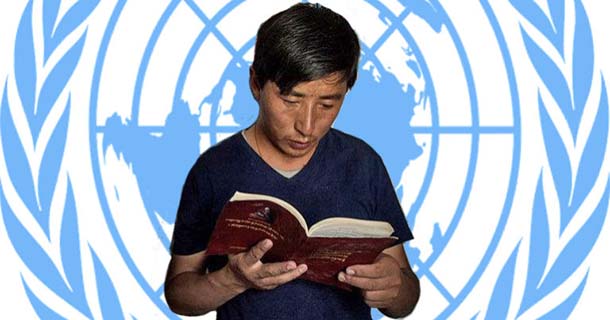
Photo: tibet.net
Six United Nations Human Rights experts- five United Nations Special Rapporteurs and the Chair-Rapporteur of the Working Group on Arbitrary Detention –issued a statement on June 6 condemning the five-year jail sentence handed to Tashi Wangchuk, the32-year old Tibetan language activist, by a Chinese court for voicing his opinions onthe cultural and linguistic rights of the Tibetan minority of China.Last month, on May 22, the Intermediate Court in Yushu, Qinghai province announced the sentence – nearly five months after Tashi Wangchuk’s case was heard in court.
In 2016 Tashi Wangchuk appeared in a New York Times video speaking about his efforts to preserve his native language in Tibet. The video showed Tashi’s attempts in Beijing to get state media and courts to address what he describes as the diminishing of the Tibetan language and the “systematic slaughter of Tibetan culture”. Tashi spoke in the video in Mandarin, talking about the “pressure and fear” felt by Tibetans,though he never advocated independence from China – which was the primary accusation against him.
He was arrested on January 27, 2016 for participating in the documentary and speaking against the oppression of Tibetan culture by Chinese authorities. He has been under arrest since then.The court made clear in its verdict that it found him guilty of “incitement to separatism” and handed a five-year prison sentence.
Following the verdict, agroup of UN human rights experts issued a press statement on the official website of Office of High Commissioner for Human Rights, condemning the sentencing and saying, “Governments should under no circumstances undermine or repress legitimate human rights advocacy and action, such as in this case, using national security, public order or anti-terrorism discourses.”
In December last year the UN Working Group on Arbitrary Detentionissued an opinion which found that Tashi Wangchuk’s detention was arbitrary and in contravention of the Universal Declaration of Human Rights.However, the Chinese court still went ahead with its decision.
The UN Human Rights group, in its appeal, has asked the Chinese Government to provide information about specific measures undertaken to promote and protect the linguistic and cultural rights of the Tibetan minority. “We regret that, to date, the Government of China has not yet provided us with a satisfactory response,” they wrote on the website.




 Print
Print Email
Email